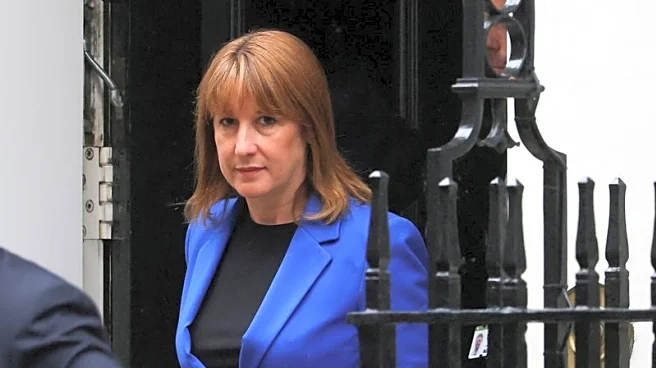By William Schomberg
LONDON (Reuters) -Britain's budget rumour mill was already in full swing well before a date was set on Wednesday, with speculation about tax increases posing a further risk to confidence
among businesses and households already anxious about inflation and job losses.
Media reports have suggested finance minister Rachel Reeves is considering new taxes on home sales, ways to make more people pay income tax, changes to pensions relief and possibly new levies on banks and gambling in her annual budget, now set for November 26.
Britain grew faster than any other Group of Seven economy in the first half of 2025, but much of the momentum was driven by higher public spending and a rush by manufacturers to get ahead of U.S. President Donald Trump's import tariffs.
The public finances remain weak and analysts say Reeves will have to raise taxes by at least 20 billion pounds ($27 billion) - and possibly double that - to remain on course to hit her own fiscal targets.
The Confederation of British Industry has already called on the government not to repeat last year's tax increase on employers and in August linked a fall in confidence, investment and activity among services firms to short-term uncertainty.
Last month, the Royal Institution of Chartered Surveyors said talk of new taxes on home sales was causing concern, while some analysts believe a surprise dip in house prices reported this week might be a sign of weakness to come.
And wage data firm Brightmine has said private sector employers are unlikely to raise workers' pay settlements from below-inflation levels until the budget picture becomes clearer.
Neil Bellamy, consumer insights director at GfK, which publishes Britain's longest-running gauge of consumer confidence, said reports about tax increases were probably having an impact on the public mood.
"It's something people are more aware of in terms of how this could impact me directly," he said.
High levels of household savings point to consumer caution, while offering the prospect of stronger spending at some point.
Deutsche Bank analysts said a new "Fear Index" based on the bank's surveys showed British consumers are more anxious than at any point since the pandemic, due to worries about unemployment, higher inflation and the reports of possible tax increases.
For businesses, uncertainty around the budget comes after the shocks of Brexit, COVID-19, the 2022 surge in energy prices and Trump's tariffs.
"If they are in a position to be able to invest, they're still hovering over that button," CBI Chief Economist Louise Hellem said. "They feel that if we just wait a couple of weeks or wait a couple of months, it'll all become a bit clearer. And we never seem to quite get to that point."
Hellem, who once helped prepare annual budgets as a Treasury official, said the government was showing it wanted to create a longer-term strategy for the economy.
It is seeking to streamline the planning system and boost investment - both public and private - in infrastructure.
Hellem also welcomed the government's intention to get more people into work, but said last year's tax increase for employers and uncertainty about plans to give workers more rights risked having the opposite effect.
BOND MARKETS ARE WATCHING
In her first budget last year, Reeves ordered Britain's biggest tax hikes in three decades, with most of the 40 billion pounds of revenue raisers falling on employers.
She has said no further tax increases on that scale are planned.
Prime Minister Keir Starmer dropped proposals in June for big welfare savings, however, while Britain's fiscal watchdog is expected to lower its economic growth projections, cutting future tax flows.
That leaves Reeves with little option other than to raise taxes to keep on track for her fiscal targets - chief among them a pledge to balance day-to-day spending with revenues by the end of the decade - or risk trouble in the bond market.
Investors remain hyper-sensitive to Britain's big borrowing needs after the 2022 "mini-budget" crisis under former Prime Minister Liz Truss. This week, 30-year borrowing costs hit their highest since 1998 amid a broader government debt sell-off.
The fine margins of error in Reeves' plans for meeting her fiscal rules - which unusually in Britain are assessed twice a year - also raise the risk that similar uncertainty will drag on the economy ahead of future budgets.
That prospect has prompted calls for the eventual restoration of more headroom in budget plans, or more root-and-branch changes to the rules.
"If you want growth to happen, you want firms that are investing to be sure about what's going to happen over the next few years," Stephen Millard, deputy director for macroeconomics at the National Institute of Economic and Social Research, a think tank, said.
But the likelihood of Reeves carving out more headroom in this year's budget is slim because of the political costs of very big tax increases or deep spending cuts, Millard said.
Britain's government might also be tempted to follow the lead of European Union countries which in March agreed they could temporarily spend more on defence without breaking the bloc's rules.
"If we're back into the same conversation in a year's time, I think there will be some honest conversations about whether the fiscal framework is fit for purpose," Sanjay Raja, Deutsche Bank's chief UK economist, said.
($1 = 0.7402 pounds)
(Editing by Catherine Evans)










